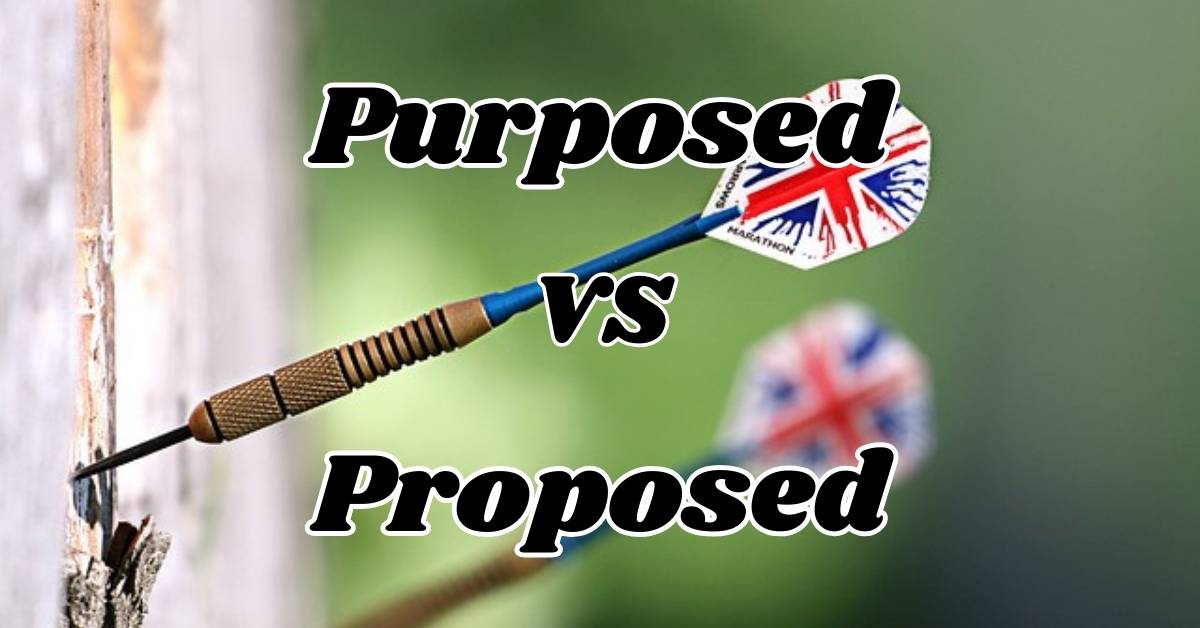Purposed vs Proposed can be a source of confusion for many, yet understanding the distinction between these two terms is crucial for effective communication. While both words relate to intentions and suggestions, they serve different purposes in language.
Purposed refers to having a specific aim or goal, highlighting the intention behind an action. In contrast, proposed involves putting forward an idea or plan for consideration.
This article will explore the definitions, usages, and common mistakes associated with purposed and proposed, helping you navigate their meanings with confidence. By the end, you’ll have a clear understanding of how to use these terms correctly in various contexts.
Quick Summary
Purposed refers to having a specific aim or intention, while proposed relates to suggesting an idea or plan. Recognizing this difference is essential for effective communication, especially in professional settings where clarity is crucial.
Understanding Purposed vs Proposed
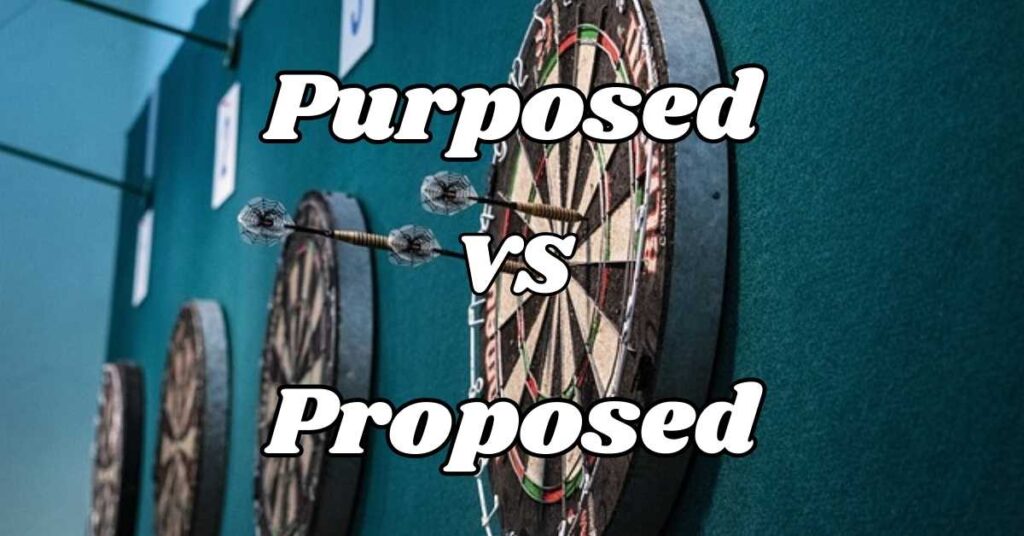
When we talk about purposed, we refer to a clear intention or goal behind an action. For instance, if someone says they purposed to improve their skills, it means they have a specific aim in mind.
On the other hand, proposed is about offering a suggestion or plan to others. If you propose a new project at work, you’re putting forward an idea for consideration. Understanding these subtle differences can help avoid misunderstandings in conversations.
Origins of the Purposed
“Purpose” originated around 1300 from the Anglo-French term “purpos,” meaning intention or aim. It evolved from the Old French “porpos,” which translates to an aim or intention. This term is linked to the Latin “propositum,” meaning a thing proposed or intended.
The verb form, appearing in the late 14th century, derives from “purposer,” meaning to propose or design. Over time, “purpose” has come to signify not just an intention but also the reason for existence or action, highlighting its importance in both personal and professional contexts.
Origins of the Proposed
“Propose” emerged in the mid-14th century, originating from the Old French word proposer, meaning to suggest or advance. It combines pro, meaning “forth,” and poser, meaning “to put or place.” Initially, it referred to forming a design or intention and later evolved to include offering ideas for consideration.
The phrase “to propose marriage” first appeared in the 18th century, showcasing the term’s broad application in both personal and formal contexts. Understanding its origins enriches our grasp of its usage in modern language.
Purposed: Definition and Usage
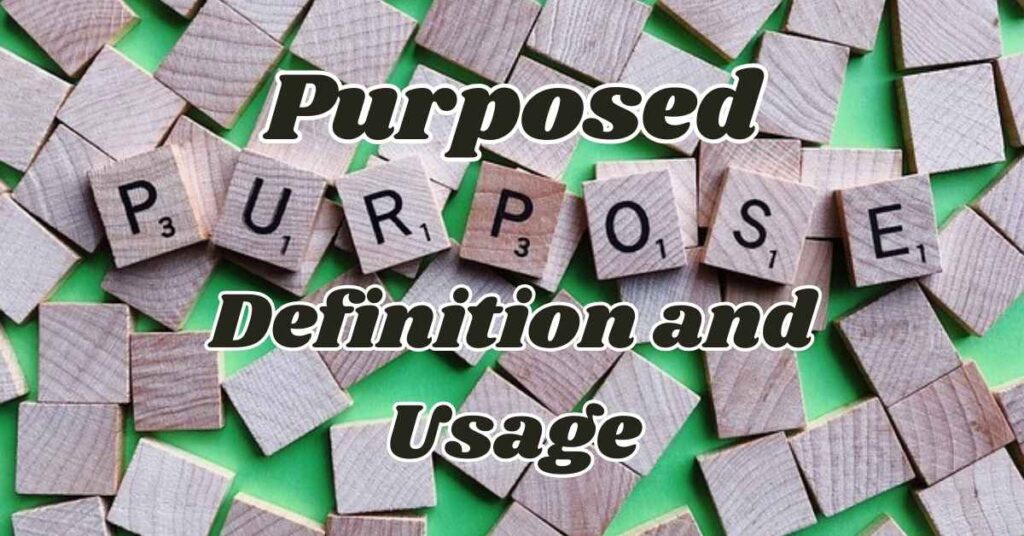
“Purposed” refers to having a specific intention or goal in mind. It signifies a deliberate decision to act with a particular aim or objective. When someone describes an action as “purposed,” they emphasize that it is not random but rather planned and thought out.
This word often conveys a sense of determination, highlighting the importance of having clear intentions in both personal and professional contexts.
Purposed Definition
“Purposed” is an adjective derived from the noun “purpose.” It describes actions or decisions made with intention or design. For example, if someone has a purposed approach to their career, it means they have clear goals and strategies in place to achieve them.
This term underscores the significance of being mindful about one’s objectives.
Scenario
Imagine a student who sets out to improve their grades. They create a study schedule, seek help from teachers, and prioritize their assignments. In this scenario, the student’s actions are purposed; every step they take is intentional and directed toward achieving their academic goals. This illustrates how having a clear purpose can guide decisions and lead to success.
Purposed Usage
You often encounter purposed in discussions about goals and intentions. For example, someone might say they purposed to volunteer more this year, indicating a clear aim behind their actions.
Usage of Purposed in Different Contexts
- In personal development: “She purposed to learn a new language.”
- In business: “The team purposed their efforts towards increasing sales.”
- In academics: “He purposed his research on environmental sustainability.”
- In creative writing: “The author purposed her story to inspire readers.”
- In casual conversation: “They purposed their weekend for relaxation.”
Synonyms of Purposed
Some synonyms for purposed include
- Aim
- Goal
- Intention
- Objective
- Design
- Plan
- Aspiration
- Target
- Mission
- Resolve
These words convey similar meanings and can be used interchangeably depending on context.
Proposed: Definition and Usage
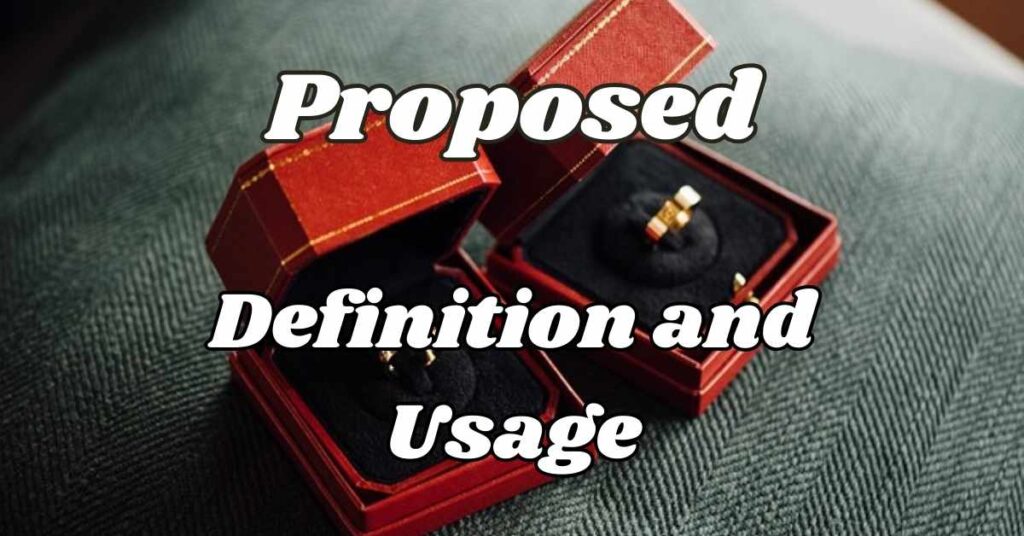
“Proposed” refers to the act of suggesting or putting forward an idea, plan, or course of action for consideration. It implies that someone is presenting something that they believe could be beneficial or worthy of discussion.
When a proposal is made, it invites feedback, collaboration, or approval from others. This word is commonly used in various contexts, including business meetings, academic settings, and everyday conversations, highlighting the importance of communication and shared decision-making.
Proposed Definition
“Proposed” is the past participle of the verb “propose.” It signifies that an idea or plan has been formally suggested to others for evaluation. For example, a proposed budget in a meeting indicates that someone has laid out financial plans for discussion.
This term emphasizes the act of advancing thoughts or recommendations for collective consideration.
Scenario
Consider a community meeting where a resident proposes a new park. They present their idea, outlining benefits such as increased green space and recreational opportunities. The proposal encourages discussion among attendees, allowing them to share their opinions and suggestions.
In this scenario, the resident’s proposed plan serves as a catalyst for community engagement and potential action.
Proposed Usage
You will find proposed used frequently in formal and professional settings when discussing suggestions or plans. For instance, someone might propose changes to company policy during a meeting.
Usage of Proposed in Different Contexts
- In business meetings: “She proposed a new budget plan.”
- In social gatherings: “He proposed that we organize a charity event.”
- In project management: “The manager proposed extending the project deadline.”
- In academic discussions: “They proposed further research on climate change.”
- In everyday conversations: “I proposed we try that new restaurant.”
Synonyms of Proposed
Synonyms for proposed include
- Suggested
- Recommended
- Offered
- Put forward
- Presented
- Introduced
- Advocated
- Advised
- Planned
- Submitted
These alternatives can help diversify your language usage when discussing ideas or plans.
Side by Side Comparison
When comparing purposed and proposed, it’s essential to note their different meanings and usages:
| Aspect | Purposed | Proposed |
| Part of Speech | Verb/Noun | Verb |
| Meaning | Intent or aim | Suggestion or plan |
| Usage Context | Specific intentions | Offering ideas |
Everyday Usage Examples

Understanding how “Purposed” and “Proposed” fit into everyday language can enhance your communication skills. These terms frequently appear in various contexts, from casual conversations to formal discussions.
For instance, when someone says they have a purposed plan for their weekend, it indicates they have specific activities in mind. Conversely, if a friend proposes a new restaurant for dinner, they are suggesting an idea for the group to consider.
By recognizing these examples, you can better appreciate the nuances of each word and use them effectively in your daily interactions.
Purposed Example
To illustrate how to use purposed, consider these sentences:
- She purposed to finish her project ahead of schedule.
- The initiative was purposed for community development.
- He purposed his time wisely by focusing on his studies.
- They purposed their resources toward disaster relief.
- The organization was purposed to promote cultural awareness.
Proposed Example
Now let’s look at examples using proposed:
- He proposed a new initiative for employee wellness.
- She proposed that we hold our next meeting online.
- The committee proposed amendments to the original plan.
- They proposed collaborating with local artists.
- The architect proposed several design concepts for review.
Real-World Applications
The concepts of “propose or purpose” have significant real-world applications across various fields, including business, education, and personal development. Understanding how to effectively propose ideas and maintain a clear purpose can lead to successful outcomes.
This section explores how these terms manifest in practical situations, illustrating their importance in everyday life.
Propose in Action
In a business meeting, a manager might propose a new marketing strategy to boost sales. By outlining the plan’s benefits and expected outcomes, the manager invites team members to discuss and refine the idea. This collaborative approach can lead to innovative solutions and stronger team engagement.
Purpose in Action
A student with a clear purpose for their studies sets specific academic goals and develops a study schedule. This focused approach helps them prioritize tasks and stay motivated.
By understanding their purpose, they can make informed decisions about time management and resource allocation, ultimately leading to greater academic success.
Exceptions To The Rules
While “purposed” or “proposed” generally follow specific grammatical rules, there are exceptions to consider. These exceptions can arise in various contexts, affecting how the terms are used.
Understanding these nuances is crucial for accurate communication and can help avoid common misunderstandings in both writing and speech.
Exceptions For Purposed
One exception for “purposed” occurs when it is used in a more informal context. Sometimes, people may use the term loosely to describe actions that lack a clear intention, which can dilute its meaning. It’s important to maintain clarity when using this term.
Exceptions For Proposed
“Proposed” can also have exceptions, particularly in legal or formal documents. In these cases, proposals might be presented without extensive discussion or input from others, leading to misunderstandings about the level of consensus required. Clear communication is essential to avoid confusion in such situations.
Common Mistakes and Confusions
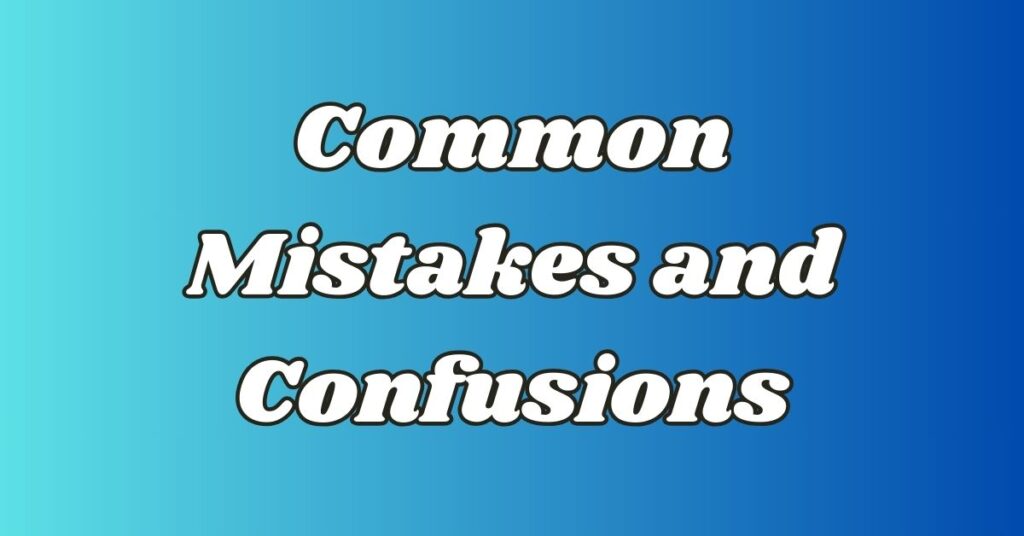
Many people mix up propose and purpose, often using them interchangeably due to their similar sounds but different meanings.
Mixing Up Propose and Purpose
One common mistake is confusing “propose” with “purpose.” While “propose” involves suggesting an idea or plan, “purpose” refers to the reason behind actions or decisions.
This mix-up can lead to unclear communication, especially in formal settings. To avoid confusion, it’s essential to understand the distinct meanings and contexts of each term.
Clarifying Their Usage
Another frequent error is using these terms interchangeably in conversation or writing. For instance, saying someone has a “purpose” for a proposal can mistakenly imply they are merely suggesting something without clear intent.
Being mindful of the specific definitions will help ensure your message is conveyed accurately and effectively..
Tips to Avoid Confusion
To avoid these mistakes:
- Always consider the context of your sentence.
- Remember that purposed relates to intention while proposed relates to suggestions.
- Practice using both words correctly in sentences until you feel comfortable distinguishing between them.
More Article: Momment or Moment: What’s The Difference?
FAQs: Purposed vs Proposed
How do you use purposed?
You use “purposed” to describe actions taken with a specific intention or goal in mind, such as “She has a purposed plan for her career.”
How do you use the word proposed?
“Proposed” is used when suggesting an idea or plan, as in “He proposed a new strategy during the meeting.”
What is the correct word for purpose?
The correct word for “purpose” is simply “purpose,” which refers to the reason or intent behind an action.
What is the legal term for propose?
In legal contexts, the term “propose” often refers to making a formal suggestion or recommendation, such as in a contract or agreement.
What is it called when you propose?
When you propose, it is often referred to as making a proposal, especially in contexts like marriage or business.
Conclusion
Understanding the difference between Purposed vs Proposed is essential for clear and effective communication. While purposed emphasizes a specific intention or goal, proposed focuses on suggesting an idea or plan for consideration.
By recognizing these distinctions, you can avoid common mistakes and enhance your language skills in both personal and professional settings. Remember to practice using these terms correctly, as mastering the nuances of purposed and proposed will significantly improve your writing and verbal communication, making your interactions more precise and impactful.
More Article: Country’s or Countries: Which One is Correct?

